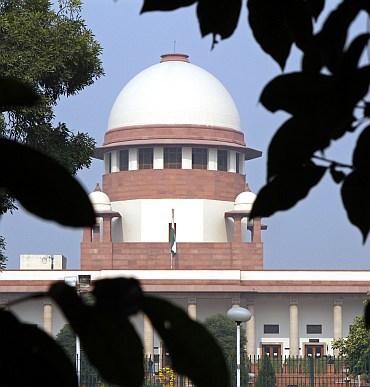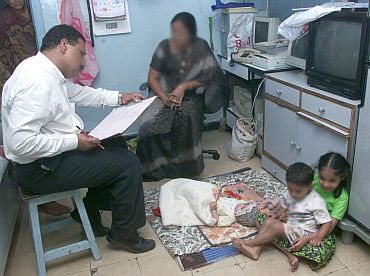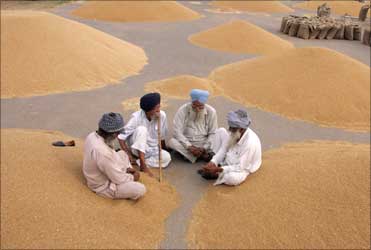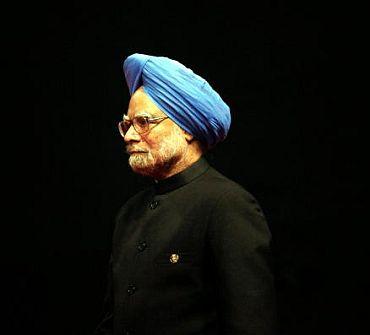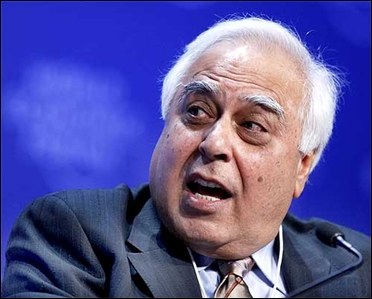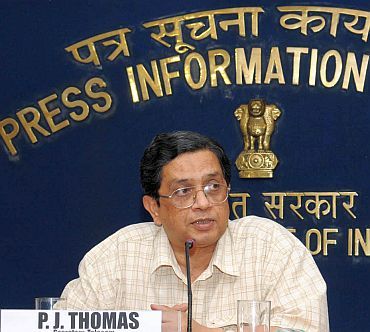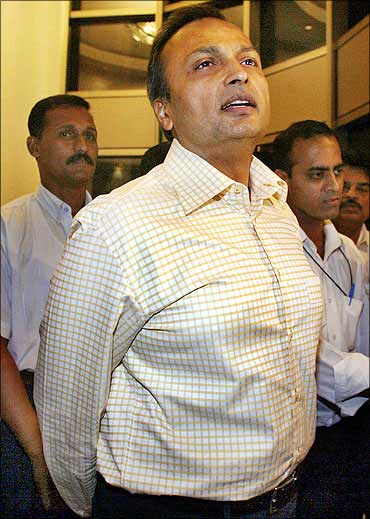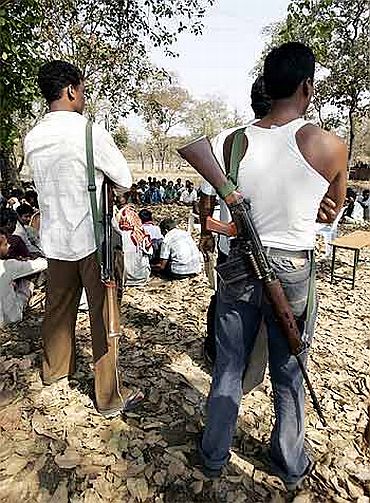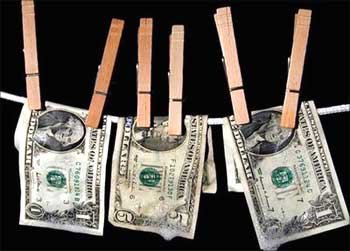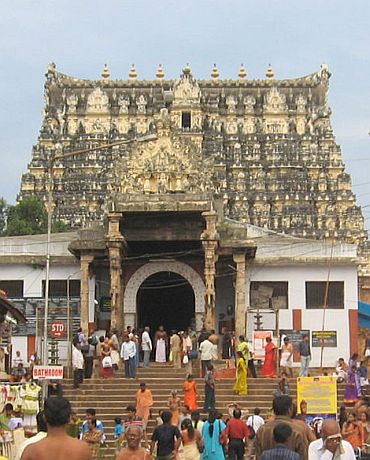 | « Back to article | Print this article |
When the Supreme Court rose to the occasion
The Supreme Court has, with its latest set of rulings, observations and orders hauling up the government, yet again established its supremacy as the apex judicial body in India.
On July 15, responding to a public interest litigation filed by a non-governmental organisation which fights for the rights of sewage workers, an SC bench comprising Justices G S Singhvi and A K Ganguly gave the government a two-month deadline to ensure that such workers have better working conditions and protective gear.
The bench was responding to a PIL that highlighted recurrent deaths of sewage workers trapped in manholes.
The bench, in a 45-page judgement, added that it would be failing in its duty if it did not accept genuine PILs, and shot back at critics who have often grumbled about 'the unnecessary piling up of PILs in courts at a time when cases have already been pending for long years', accusing them of 'elitist behaviour'.
As the courts have been used to vindicate the rights of the wealthy and affluent, did not the sewage workers, who belong to the lowest strata of the society, have an equal right to make an honest living, asked the SC.
In the past, the court has pulled up the government on many issues, be it black money, clubbing of housewives, prostitutes and beggars in the census, or criticising the prime minister for alleged inaction in the 2G spectrum scam. While some constitutional experts welcomed the decisions, others wondered if the judiciary was overreaching itself.
We bring you a chronological summary of these SC rulings. Whether this is indeed an overdose of judicial activism is for you to decide:
Click NEXT to read further...
'Bias against women is shockingly prevalent in the work of census'
On July 4, 2010, the SC expressed dismay at clubbing housewives with beggars, prostitutes and prisoners under the 'economically non-productive' category in the census, describing the approach of the statuary authorities as "callous" and "totally insensitive."
A bench comprising Justices G S Singhvi and A K Ganguly observed that it was indicative of a strong bias against women.
"This bias is shockingly prevalent in the work of census. In the census of 2001, it appears that those who are doing household duties such as cooking, cleaning of utensils, looking after children, fetching water, collecting firewood have been categorised as non-workers and equated with beggars, prostitutes and prisoners who, according to census, are not engaged in economically productive work," Justice Ganguly said.
"We often forget that the time spent by women in doing household work as homemakers is the time which they can devote to paid work or to their education. This lack of sensitiveness and recognition of their work mainly contributes to women's high rate of poverty and their consequential oppression in society, as well as various physical, social and psychological problems," the judges observed.
Click NEXT to read further...'Give food grains to the poor, not rats'
In a country where millions go with just one meal a day and one third of the population lives below the poverty line, it is criminal that the government would allow food grains to rot. The court also thought the same, and on August 12, 2010, intervened, and asked the government to distribute the grain that was getting damaged among the poor.
The court was reacting to media reports that nearly 17.8 million tones of grain was being stored under tarpaulin across the country, and was gradually rotting.
On August 31, 2010, the Supreme Court made it clear that it had ordered free distribution of foodgrains to the poor instead of allowing it to rot, and rejected Union Agriculture minister Sharad Pawar's contention that it was a suggestion which could not be implemented.
"It was not a suggestion. It is there in our order. It is part of our order. You tell the minister about it," a bench of Justices Dalveer Bhandari and Deepak Verma told the government counsel Additional Solicitor General Mohan Parasaran.
"We have to develop a culture of zero tolerance towards corruption. Unless immediate and urgent steps are taken, the ultimate effect will be on the poorest citizen who is deprived of legitimate entitlement for food grains," the bench observed.
The apex court suggested that the government can also explore its suggestion for enhancing the allocation of food grains to the states to overcome the problem of rotting grains in government godowns.
Click NEXT to read further...
'Why not legalise corruption?'
"It is very unfortunate that there is no control over corruption in the country. There is rampant corruption particularly in the department of Income Tax, Sales Tax and Excise Department. Nothing moves without money," a bench of Justices Markandeya Katju and T S Thakur said.
In a sarcastic vein, the bench said "Why doesn't the government legalise corruption so that a specific amount is fixed for every case?"
"Let us say if a man wants his case to be settled, he can be asked to pay Rs 2,500. That way, every individual will know how much bribe he has to pay. There is no need for any bargaining by the official and the people will also know beforehand how much they have to pay without any worry," the bench said.
"Poor government officials, we can't blame them also because of the growing inflation," the bench said.
In another case, the bench also ticked off a senior counsel after he appeared in a cheque bounce case for an accused.
"We did not expect at least a counsel of your stature to appear for such people. Mahatma Gandhi was also an advocate, but he never appeared for such people," Justice Katju observed.
The senior counsel initially shot back, saying, "My Lord, in that case I would be losing most of my clients!" a remark that had the court room burst out laughing.
Later, the counsel said he would definitely keep the court's suggestion in mind while appearing in future cases.
Click NEXT to read further...SC raps prime minister for alleged inaction in 2G scam
On November 20, 2010, the SC pulled up Prime Minister Manmohan Singh for taking very long (almost 11 months) to decide if ex-telecom minister A Raja can be prosecuted for his involvement in the 2G scam.
A bench comprising Justices G S Singhvi and A K Ganguly observed, "The alleged inaction and silence is worrying us."
Raja was indicted in a report by the government's auditor for costing the government nearly Rs 1.76 lakh crore by refusing to auction the spectrum in January 2008.
In November 2008, former law minister and Janata Party leader Subramanian Swamy wrote to the prime minister, asking for permission to prosecute Raja.
The SC made it clear that Swamy's report against Raja was not vague, since he had clearly referred the process of giving undue benefits to some telecom companies.
"For good governance, there must be some time-limit for granting sanctions, if not three months. But 11 months is too long," the bench observed.
Click NEXT to read further...'You should behave with some responsibility'
On January 21, 2011, the Supreme Court severely criticised Telecom Minister Kapil Sibal for making statements undermining the Comptroller and Auditor General of India's report on the 2G spectrum scam and asked him to behave with some sense of responsibility.
A forthnight earlier, Sibal had rejected the estimates of the CAG on the loss of Rs 1.76 lakh crore on account of allocation of 2G spectrum to telecom operators, saying, "It had no basis and was utterly erroneous."
"It is unfortunate. The minister should behave with some sense of responsibility," the bench of Justices G S Singhvi and A K Ganguly said.
Sibal had said that the "CAG has done injustice to itself and the Opposition is doing injustice to the aam aadmi."
The bench also sought the reply of the Telecom Regulatory Authority of India for allegedly not taking action against the telecom firms and defaulting in meeting their roll out obligations.
The bench also directed the Central Bureau of Investigation to go ahead with the probe into the scam without getting influenced by anybody's statement.
"In our opinion, the CBI which is conducting the investigation into the 2G scam is expected to carry out the probe without being influenced by the statement made by anybody, anywhere, including the press," the bench said.
Click NEXT to read further...
SC quashes the appointment of Central Vigilance Commissioner
Dealing a big blow to the government, the SC quashed the appointment of P J Thomas as Central Vigilance Commissioner, on March 3, 2011.
The apex court held that the recommendation made by the high-powered panel -- headed by Prime Minister Manmohan Singh -- did not consider the relevant material and therefore its advice "does not exist in law".
Thomas was an accused in the 1991-92 palmolein oil import scam in Kerala. The price of import was higher than the fixed international price, and cost the exchequer a loss of Rs 2.32 crore. The import order was signed by Thomas, who was then Kerala's food secretary.
Thomas was accused No 8 in the case.
A bench comprising Chief Justice S H Kapadia and justices K S Radhakrishnan and Swatantra Kumar said, "We declare that the recommendation made by the high-powered committee is non-existent in law. Which means that the recommendations made on September 3, 2010 for appointment of Thomas as CVC does not exist in law. Consequently, the appointment of Thomas goes."
In comments that came as an embarrassment for the prime minister, the bench severely criticised the committee for not considering the relevant material.
The bench reprimanded the panel for not considering the pending criminal case against Thomas in the Palmolein import case and the recommendations of the department of personnel between 2000 and 2004 for initiating disciplinary proceedings against him.
Click NEXT to read further...'Why didn't you cancel Reliance Infocomm's licence?'
On February 11, 2011, the SC slammed the government for not cancelling the licence of telecom giant Reliance Infocomm for illegally tapping the telephone of politician Amar Singh on the basis of forged orders.
Reliance Infocomm had intercepted Singh's telephone between October 22 and December 21, 2005 on the basis of two letters of the 'competent authority'. The letters had several grammatical errors and subsequently it was found that the signatures of officers were forged.
"There were gross errors in the letter on which the interception was done. The government should have cancelled the licence of the service provider per se," a bench comprising Justices G S Singhvi and A K Ganguly said.
"Anybody's communication can be intercepted by the unscrupulous service provider. It is an extremely dangerous situation that is happening," the bench observed while criticising the government for its inaction.
"Can you see where things have reached? It has sunk so low. The government doesn't seem to have taken action in a serious matter. Why has the government not taken any action," the bench said, adding, "All of you are in league and the court is the soft target".
The court was hearing a petition filed by the former Samajwadi Party leader who had sought judicial inquiry into the illegal tapping of his telephone allegedly at the behest of his political rivals, including the Congress.
Interestingly, on May 12, 2011, the SC dismissed Singh's petition, and also lifted a February 27, 2006 ban on publication of his illegally recorded conversations.
Click NEXT to read further...
'Appointing tribals to counter Maoists is unconstitutional'
On July 5, 2011, the Supreme Court restrained the Chhattisgarh government and the Centre from appointing tribals as special police officers and arming them to counter Maoists, terming the step as "unconstitutional".
Asking the Chhattisgarh government and the Centre to desist from appointing the tribals as SPOs and arming them for countering the Naxals in any manner directly or indirectly, a bench comprising Justices B Sudershan Reddy and S S Nijjar said that the appointment of tribal youths as SPOs was "unconstitutional".
The bench said the eligibility criteria including the educational qualification and training of the tribals to combat Maoists goes against the provisions of statutes and the Constitution.
It said the creation of Koya Commandos and Salwa Judum was in violation of the Constitution. The special police officers have been given the name Koya Commandos after that of a tribe in the Dantewada region.
The issue of SPOs had arisen during the hearing of a petition against the existence of the Salwa Judum (vigilante groups) in Naxal-hit regions of the state to fight Maoists.
The petition was filed by sociologist Nandini Sundar, historian Ramachandra Guha, former bureaucrat E A S Sarma and others seeking a direction to the state government to refrain from allegedly supporting the Salwa Judum.
During a hearing on the issue on May 4, 2011, the state government had justified the appointment of SPOs saying they have excelled in performing police duties.
It had also asserted that in anti-Maoist operations, the SPOs were of immense help in their role as guides, translators, spotters and on certain occasions they have saved the lives of regular security personnel while preventing more than dozen Maoist attacks on relief camps and helped security forces in anti-Naxal operations.
However, the court was of the view that arming tribals would lead to a "dangerous" situation if they turned against the State.
The court had also questioned the training programme of the SPOs.
"You are playing with the so-called SPOs. What will happen if they turn against the State. God save this country," the bench had said during the last hearing.
Click NEXT to read further...SC's no confidence in government on black money
On July 4, 2011l, the Supreme Court appointed a high-level Special Investigation Team headed by former apex court judge BP Jeevan Reddy to monitor the investigation and the steps being taken to bring back black money stashed away in foreign banks.
A bench comprising Justices B Sudershan Reddy and S S Nijjar directed that the High-Level Committee constituted by the government to look into the issue of black money would "forthwith" be a part of the SIT.
The bench also directed the government to disclose the names of all the persons who were issued show cause notices by the authorities in connection with the probe into the black money issue.
Click NEXT to read further...Opening of Padmanabhaswamy temple vaults
The discovery of treasure well over Rs 90,000 crore from the vaults of Sri Padmanabhaswamy temple in Thiruvananthapuram in Kerala a few weeks ago stunned the nation.
How the temple amassed so much wealth is no secret. In 1750, Marthanda Varma, the then king of Travencore abdicated his throne in favour of Lord Padmanabha, declaring himself and his descendants as servants of the deity, following bloody infighting for the throne.
By doing so, Varma ensure that his kingdom was no longer prone to future attacks by neighbouring kingdoms, since Travencore was now ruled by a deity. In turn, the neighbouring kings made generous donations to the temple vaults to appease the god. And soon, the coffers were flowing with gold, and valuables.
While all major temples of the area were handed over to the Travancore Devaswom Board after merger of the princely state with the Indian Union after 1947, control of the Padmanabhaswamy temple was retained by the royal house through a covenant with the government.
Though the last royal ruler Sree Chithira Tirunal Balarama Varma left the entire treasure untouched he was made 'Rajapramukh' (status equivalent to Governor) after the merger.
Following the discovery three centuries later, authorities rushed to secure the treasure. Soon, heated discussions were flying to and fro, about how the wealth should be preserved and utilised.
Speculations were rife on the eventual fate of the wealth -- whether it will be used for charitable purposes or remain with the temple authorities.
The law in such cases stipulates that only the temple deity has a 'right' over this wealth.
As per Indian laws, a temple deity is considered to be a juristic person. A juristic or a legal person is entitled to the wealth it has been given and can even fight a legal battle to keep it.
The Supreme Court stepped in, and appointed a seven-member panel to oversee the opening of the vaults. The team, however, was unable to open vault 'B', even after repeated efforts.
Then, on July 8, 2011, the SC bench comprising Justices R V Raveendran and A K Patnaik restrained the committee from opening the vaults.
The bench asked the petitioner Raja Marthanda Varma, erstwhile Prince of Travancore, and the Kerala government to come out with appropriate suggestions for ensuring the sanctity and security of the ancient temple, which has come to the limelight following the discovery of the huge wealth.
